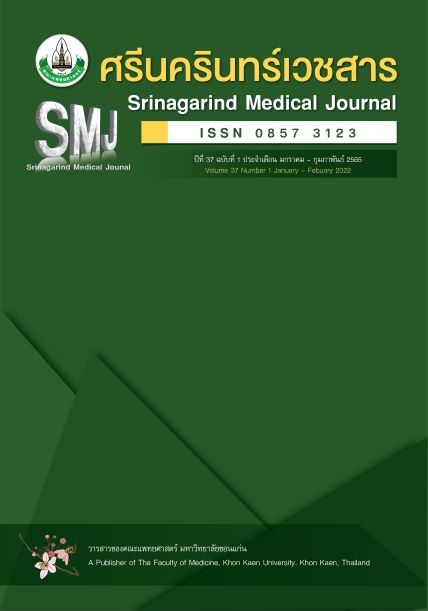Predictors of Stress from Online Learning among Pharmacy Students
Keywords:
Stress, online learning, predictor, institutions of higher educationAbstract
Background and Objective: Measure and monitoring of pandemic of COVID 19 issue 10 stated that institutions of higher education must arrange the distance or electronic learning. The COVID 19 situations as well as rapid change in learning make the students worrisome.
Methods: This survey study was conducted in 1st to 5th year pharmacy students to explore the predicting factors of harmful stress and the predicting factors of negative solution. The data was collected by online questionnaire during January to February 2021.
Results: Of 322 students, the average age was 20.87 years old. The student with the harmful stress reported the problems of learning (77.40 vs 32.20, p<0.001) and the worry of their future (76.60 vs 26.40, p<0.001) as the most common causes. The predicting factors of harmful stress were long learning period (OR=4.56; 95%CI=2.22-9.37) similar to the expense for online learning (OR=4.51; 95%CI=1.62-12.55). In addition, the predicting factors of negative solution was age<20 years old (OR=0.52; 95%=0.36-0.75).
Conclusions: Suitable online learning format for students and continuing quality development in online teaching can lead to qualified learning and reducing student stress.
References
ประกาศกระทรวงการอุดมศึกษา วิทยาศสาตร์ วิจัยและนวัตกรรม เรื่องมาตรการและการเฝ้าระวังการระบาดของโรคติดเชื้อไวรัสโคโรนา 2019 (COVID 2019) 2564; ฉบับที่ 10. [เข้าถึงเมื่อ 10 พ.ค. 2564]. เข้าถึงได้จาก: https://www.mhesi.go.th/images/Pusit2021/pdfs/10-AnnCovid.pdf.
Jiang N, Li YS, Pamanee K, Sriyanto J. Depression, anxiety, and stress during the
covid-19 pandemic: comparison among higher education students in four countries in
the Asia-Pacific Region. JPSS 2021; 29:.370-383.
Davis CR, Grooms J, Ortega A, Rubalcaba JA-A, Vargas E. Distance learning and parental mental health during COVID-19. Educ. Res. 2021;50(1):61-4.
Chunin M, Rakchanya P, Pongsapitch C. Students’ techniques in managing stress at King Mongkut’s Institute of Technology North Bangkok. J. Ind. Tech.2563;3(2): 42-51.
Chantarasena T. Stress of freshmen at Srinakharinwirot university. Master Thesis M.Ed. (Higher Education). Bangkok: Graduate School, Srinakharinwirot University. 2012.
Yaribeygi H, Panahi Y, Sahraei H, Johnston TP, Sahebkar A. The impact of stress on body function: A review. EXCLI J 2017;16:1057-72.
Greenberg N, Carr JA, Summers CH. Causes and Consequences of Stress1. ICB 2002;42(3):508-16.
Boonpume N. Stress and coping of Thai traditional medicine students of Rajamangala University of Technology Thanyburi. Nakhonpathom: Silpakorn university; 2010.
Tontuan S. A study of stress and coping strategies of high school students. Master of Education (Developmental Psychology) Bangkok, Graduate School Srinakarinwirot University. 2010.
Mingprasert A. A study of mental health and the stress of undergraduate students in Faculty of Pharmacy at Rangsit University. J of Soc Sci & Hum 2014;40(2):211-27.
Pandey D, Gul R, Canete JJ, Rocha IC, Gowwrii G, Pandey B, et al. Mental stress in online learning during the pandemic: An assessment of learners' perception. AJOAIR 2021;6(3):37-49.
Wang J, Liu W, Zhang Y, Xie S, Yang B. Perceived stress among chinese medical students engaging in online learning in light of COVID-19. Psychol Res Behav Manag 2021;14:549-62.
Prasertsong C, Sanghirunruttana J, Kladkaew P. The factor related to stress of online learning due to the covid-19 situation among nursing students. Journal of Somdet Chaopraya Institute of Psychiatry 2021;15(1): 14-28.
Babicka-Wirkus A, Wirkus L, Stasiak K, Kozłowski P. University students’ strategies of coping with stress during the coronavirus pandemic: Data from Poland. PLOS ONE. 2021;16(7):e0255041.
Ingard A, Karnjanapoomi N, Sheoychitra P. Undergraduate students’ anxiety during the Coronavirus disease epidemic in 2019. MUT Journal of Business Administration 2020;17(2):95-113.
Christopher Yaw Kwaah, Essilfie G. Stress and coping strategies among distance education students at the University of Cape Coast, Ghana. TOJDE 2017;18(3):120-34.
Mheidly N, Fares MY, Fares J. Coping with stress and burnout associated with telecommunication and online learning. Front Public Health. [cited 2021 Jun 18]. Available from: https://www.frontiersin.org/articles/10.3389/fpubh.2020.574969/full.
Adedoyin OB, Soykan E. Covid-19 pandemic and online learning: the challenges and opportunities. Interact Learn Environ 2020. [cited 2021 Jun 16]. Available from: https://www.tandfonline.com/doi/epub/10.1080/10494820.2020.1813180?needAccess=true.
Gopal R, Singh V, Aggarwal A. Impact of online classes on the satisfaction and performance of students during the pandemic period of COVID 19. Educ Inf Technol (Dordr) 2021. [cited 2021 May 26]. Available from: https://doi.org/10.1007/s10639-021-10523-1.
Monteiro NM, Balogun SK, Oratile KN. Managing stress: the influence of gender, age and emotion regulation on coping among university students in Botswana. Int J Adolesc Youth 2014;19(2):153-73.
Pascoe MC, Hetrick SE, Parker AG. The impact of stress on students in secondary school and higher education. Int J Adolesc Youth 2020;25(1):104-12.
Downloads
Published
How to Cite
Issue
Section
License
Copyright (c) 2022 Srinagarind Medical Journal

This work is licensed under a Creative Commons Attribution-NonCommercial-NoDerivatives 4.0 International License.




